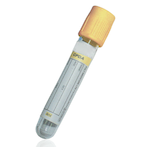Salicylate
Specimen Volume
1 mL bloodSample Preparation
Turnaround Time
24 hoursSample Processing In Laboratory
UsualSample Stability
4 ºCGeneral Information
Salicylates are ubiquitous agents found in hundreds of over-the-counter medications and in numerous prescription drugs, making salicylate toxicity an important cause of morbidity and mortality. Salicylate is used as an analgesic agent for the treatment of mild to moderate pain. The most common salicylate preparation is known as Aspirin (acetylsalicylic acid). Aspirin is used as an anti-inflammatory agent for the treatment of soft tissue and joint inflammation and vasculitides such as acute rheumatic fever and Kawasaki disease. The product is an antipyretic drug. Low-dose aspirin helps to prevent thrombosis.
Salicylate poisoning is a potentially life threatening condition which is characterised by extreme acid-base disturbances, electrolyte disturbances and decreasing level of consciousness. There is a wide variation in the clinical spectrum of toxicity. There are differences between acute and chronic toxicity and a varying clinical picture which is dependent on the age of the patient and renal function.
Patient Preparation
None
Reference Range
Not applicable (use in overdose only)
Specifications
- EQA Status: NEQAS
- EQAS Scheme: Yes








